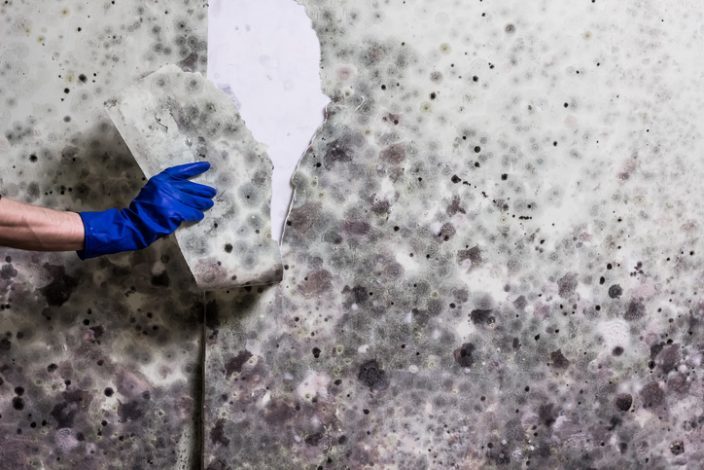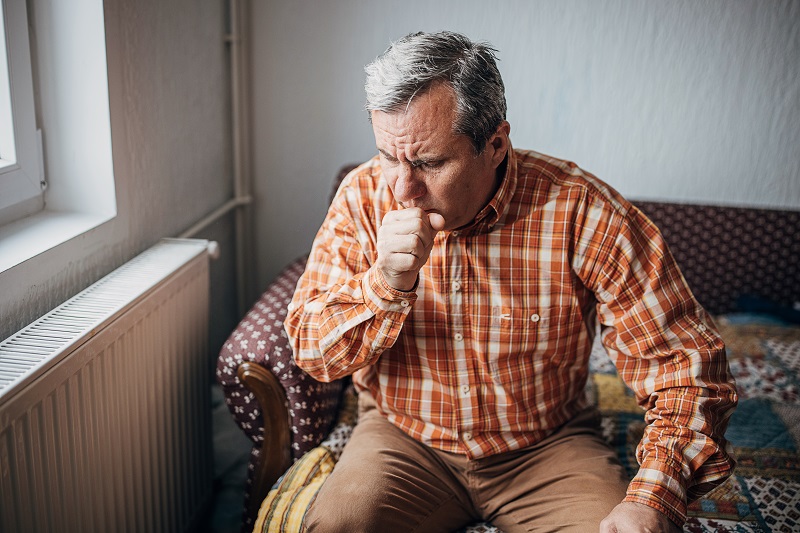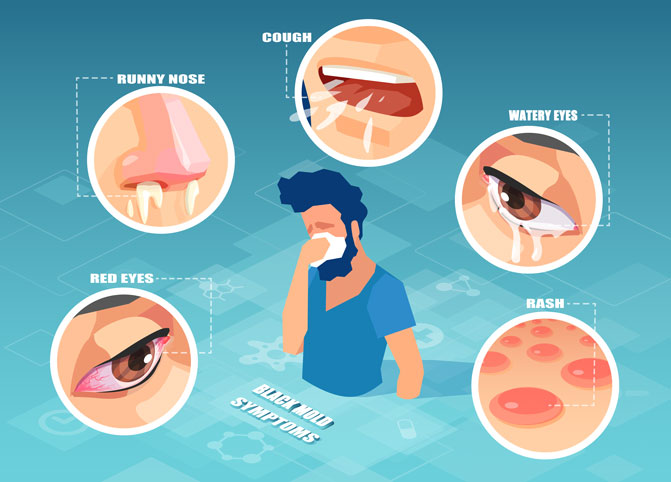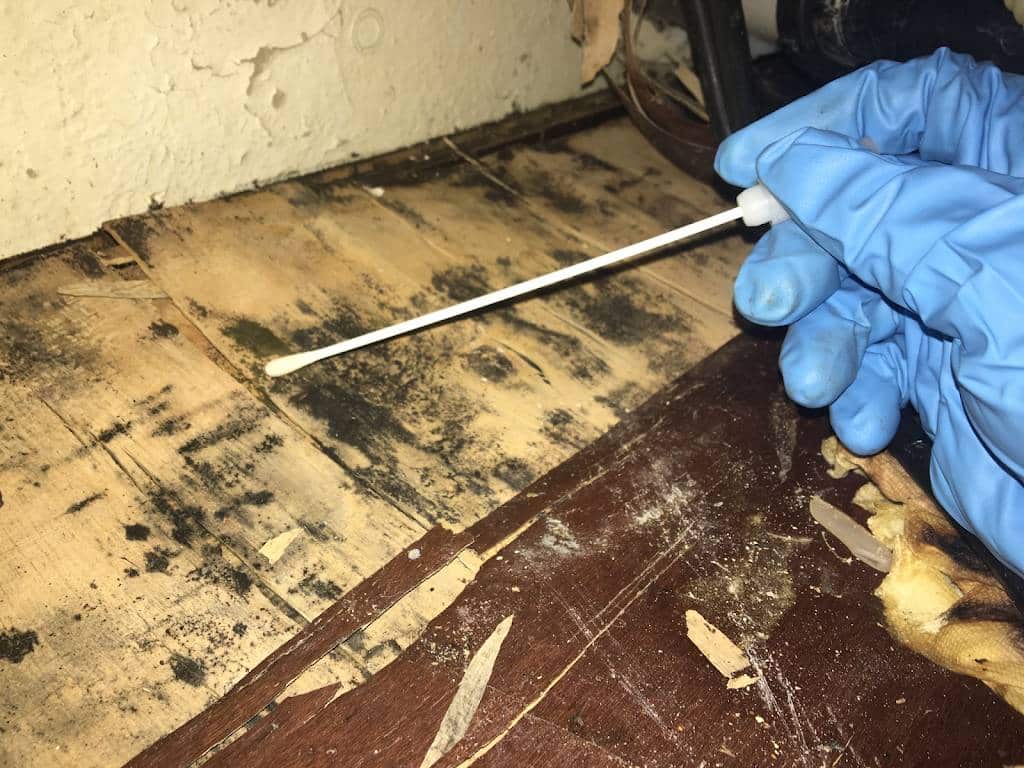What Is Black Mold?
Black mold, scientifically known as Stachybotrys chartarum, is a type of fungus that thrives in damp, humid environments. Commonly found in homes with water damage, leaks, or poor ventilation, black mold can grow on materials like drywall, wood, and fabric. The term “black mold” refers to its characteristic dark greenish-black color.

Why Is Black Mold Dangerous?
Black mold is considered hazardous because of the mycotoxins it produces, which can pose serious health risks when inhaled. While not every mold is toxic, black mold is notorious for releasing spores that may cause various respiratory issues and other health concerns.
Individuals with pre-existing conditions, such as asthma or compromised immune systems, are particularly vulnerable to the effects of black mold exposure. In some severe cases, prolonged exposure can lead to chronic symptoms that affect not only your physical health but your quality of life.
Health Risks of Black Mold Exposure
1. Respiratory Issues
The most common symptoms of black mold exposure affect the respiratory system. These can include:
- Chronic coughing and sneezing
- Wheezing and difficulty breathing
- Sinus congestion and runny nose
- Sore throat

These symptoms may resemble seasonal allergies, but prolonged exposure to black mold can intensify these effects, leading to more serious respiratory complications over time.
2. Fatigue and Weakness
Many people exposed to black mold report feeling extreme fatigue and general weakness. This could be the result of the body’s immune response trying to fight off the foreign mycotoxins.
3. Skin Irritation
Black mold exposure can also result in skin irritation, such as rashes, hives, or itching. Direct contact with the mold or its spores is typically responsible for these reactions.

4. Neurological Symptoms
In severe cases, prolonged exposure to black mold mycotoxins may lead to neurological symptoms. These include:
- Headaches
- Dizziness
- Difficulty concentrating
- Memory loss
Although these symptoms are rare, they emphasize the potential long-term effects of untreated mold exposure.
What Should You Do If You Find Black Mold?
If you suspect that black mold is present in your home, it’s crucial to address the issue as soon as possible. Procrastinating on mold remediation can result in escalating health issues and structural damage to your home.
The first step is to schedule a professional mold inspection. A qualified mold mitigation expert can assess the extent of the mold growth and recommend an appropriate course of action. At Citywide Mold Mitigation, we specialize in mold removal, remediation, and prevention to ensure your home remains a safe, mold-free environment.
You should never attempt to remove black mold on your own without proper equipment and safety precautions. Disturbing the mold can release more spores into the air, exacerbating the problem.

How to Prevent Black Mold Growth
Prevention is always the best approach when it comes to black mold. Here are some key steps you can take to prevent mold from developing in your home:
- Fix any water leaks immediately to prevent moisture buildup.
- Ensure proper ventilation in damp areas, such as bathrooms, kitchens, and basements.
- Use a dehumidifier to control humidity levels in your home, especially in humid climates.
- Regularly clean and inspect areas prone to moisture, such as under sinks and around windows.
By taking these simple steps, you can greatly reduce the risk of black mold growth and keep your living space safe.
Conclusion
Black mold poses a serious risk to both your health and home. Whether it’s respiratory issues, skin irritation, or structural damage, the consequences of mold exposure can be severe if not addressed promptly. If you believe your home has black mold, the safest solution is to contact a professional mold mitigation company. At Citywide Mold Mitigation, we help homeowners in the DFW area resolve mold problems quickly and effectively.
Protect your home and health—schedule a mold inspection today.
FAQ
1. Can black mold make you sick?
Yes, prolonged exposure to black mold can cause a range of health issues, including respiratory problems, skin irritation, and in severe cases, neurological symptoms.
2. How can I tell if I have black mold in my house?
Black mold typically appears as dark green or black spots on walls, ceilings, or other damp surfaces. It is often accompanied by a musty odor. A professional inspection is necessary to confirm its presence.
3. Can I clean black mold myself?
It is not recommended to clean black mold yourself, as disturbing it can release harmful spores. Professional removal is the safest and most effective solution.
4. Is all black mold toxic?
Not all black mold is toxic, but Stachybotrys chartarum, commonly referred to as black mold, produces mycotoxins that are harmful to human health.
5. How do I prevent black mold from growing?
To prevent black mold, keep your home dry by addressing leaks, improving ventilation, and reducing humidity. Regularly inspect areas prone to moisture.

